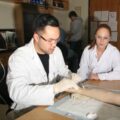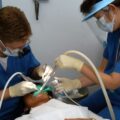Are you considering a career as a dentist? Or are you simply curious to find out how long does it take to become a dentist? Regardless of the answer, you’re going to like what we’ve prepared for you today. Becoming a dentist is definitely not an easy task. This means that it also isn’t something you can achieve in the blink of an eye. In this article, we’re going to answer the question “how long does it take to become a dentist?” and provide you with an overview of the steps you have to take in order to become one.
How Long Does It Take to Become a Dentist?
The answer to this question depends on the type of dentist you want to become. That’s right, there are multiple types of dentists out there. The amount of time you have to study and train varies according to the type. For instance, in order to become a general dentist, you have to first complete some pre-dental coursework at the university level. Then, you must attend dental school for at least 4 years. This will earn you a professional degree.
On average, it takes about 8 years of training in order for you to qualify for a general dental license that you can get from the state. Still, if you want to specialize in a certain area, you’re going to have to spend even more time training and learning. That’s because apart from mastering the general dentistry notions, you also have to master your specialization. For example, aspiring orthodontists will spend 2 to 3 years in a postgraduate orthodontics program after graduating from dental school.
What Do You Have to Study in Order to Become a Dentist?
#Undergraduate Coursework
If you know you want to become a dentist before applying to an undergraduate program, you should find one whose coursework is going to help you with the admission expectations of the dental schools you want to apply to in the future. However, if you realize you want to become a dentist after you’ve already enrolled in the undergraduate program, that doesn’t mean your dream can’t come true. Usually, the exact major you have doesn’t matter. You can earn these credits during a 4-year bachelor’s program, but a degree per se is not an explicit requirement most of the time.
Now, let’s see what are the prerequisite courses you have to take before applying to dental school:
- Biology I & II
- General Chemistry I & II
- Organic Chemistry I & II
- Physics I & II
- Calculus I & II
#Applying to Dental School
The first thing you have to keep in mind when it comes to applying to dental school is that you have to prepare quite a long time before. That’s because nowadays, admission to dental school is highly competitive. As a result, the entire application process can take up to a year to finish. Most students start preparing their primary applications towards the end of junior year. For instance, if you want to enter dental school in the fall of 2018, you should submit your first applications at the beginning of the summer of 2018.
There are two levels of application to dental school: primary and secondary (or supplemental). They’re both followed by interviews. Typically, students who pass the round of primary applications will receive the secondary applications, which usually consist of essays, and which are often due by winter.
#Dental Aptitude Test (DAT)
Another thing you should know is that before students can apply to dental school, they need to take the Dental Aptitude Test (DAT). All dental schools in the U.S. require the official DAT scores of applicants. The standardized test covers four broad areas: natural sciences (including biology and chemistry), reading comprehension, quantitative ability, and perceptual ability.
Most dental schools use rolling admissions, so early applications are crucial. To ensure competitive standing, students should take the DAT in the spring of the year before they plan to enter dental school, usually in the final semester of their junior year. Then, they should submit their primary applications no later than July 4 in order to be included in the first group of examinees.
#Dental School
Aspriring dentists will need either a Doctor of Dental Medicine (D.M.D.) or Doctor of Dental Surgery (D.D.S.) degree in order to practice. By convention, some schools offer the D.D.S., while others award the D.M.D. The curricular differences between these professionally equivalent degrees are minimal.
The first two years of dental school are mainly comprised of science classes and lab instruction. The final two years involve intense clinical practice, in which students learn to make diagnoses, conduct surgery, and carry out clinical procedures.
Finally, after 4 years of dental school, D.D.S. or D.M.D. program graduates are qualified to apply for state licensure as professional practice dentists.
Image Source: here.













Leave a Reply